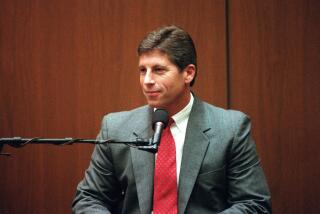Lawyers Claim Fuhrman Coerced Witnesses in ’91 Case : Courts: Attorneys for imprisoned ex-USC football player seek to have his conviction overturned.
- Share via
Lawyers for a former USC football player who pleaded guilty to a kidnaping charge in 1991 say they will file a motion today seeking to reopen the case on the grounds that ex-LAPD Detective Mark Fuhrman coerced witnesses into providing evidence against their client.
The action on behalf of Howard McCowan, 24, is the first effort to overturn a conviction involving a case investigated by the controversial detective since his audiotaped boasts of fabricating evidence and beating suspects emerged during the ongoing O.J. Simpson murder trial.
Legal experts said Monday they expect similar motions to be filed in coming months. But they also expressed skepticism about the success of such actions, particularly in cases similar to McCowan’s, in which the defendant pleaded guilty before a jury trial.
McCowan, who was a freshman defensive back at the time of his arrest, pleaded guilty to assault, battery and kidnaping for robbery in a plea bargain shortly before he was to go on trial. McCowan, who is African American, is now serving a 13-year term in Wasco state prison. If he had gone to trial he could have faced a 20-year prison sentence, his lawyers said at the time.
Fuhrman, then a detective in the LAPD’s West Division, was the investigating officer in the case. One of McCowan’s attorneys at the time, Michael Sacks, said Monday he is filing the motion to reopen the case because of Fuhrman’s recently divulged taped interviews with an aspiring screenwriter.
“McCowan took the plea bargain because of the evidence against him,” said Sacks. “That’s why Fuhrman’s role is important--because the evidence he obtained in his investigation was material and led to the subsequent conviction of our client.”
That evidence, Sacks said, was obtained from confessions given to Fuhrman by McCowan’s two co-defendants, Marcel Brown and Garlyn Coleman. Those written confessions, which the trial judge had ruled could be used as evidence against McCowan, “appear to have resulted from constitutionally impermissible coercion” by Fuhrman, Sacks charged.
Brown, who also played on the USC team, and Coleman, alleged at the time that their confessions were coerced, Sacks said. But they also agreed to plea bargains of the same length as McCowan received. The attorneys who represented Brown and Coleman were unavailable for comment Monday.
McCowan, Brown and Coleman were arrested on April 24, 1991, by Torrance police after they allegedly attacked and robbed a Redondo Beach man. Police said at the time that Brown was about to use a stolen automated teller machine card at a nearby bank.
At the time, Fuhrman told The Times the three men were suspected of two similar attacks earlier that evening in Westwood Village. “On face value,” Fuhrman said, “we have evidence to connect all four robberies.”
Legal experts were not surprised that McCowan’s attorneys would ask to reopen his case.
“What do they have to lose from the defense perspective, especially if the client is in jail?” asked Southwestern University School of Law professor Myrna Raeder.
But Raeder and other legal experts said defense lawyers will find it extremely difficult to convince any judge to reopen a case, especially when it has circumstances such as the McCowan prosecution.
“Judges want hard evidence for reopening cases,” the professor said. “It’s not as if the judge just says: ‘Oh yes, it looks as if Fuhrman once lied, or lied about his racial bias or was simply a racist.”
Veteran Santa Monica defense counsel Gigi Gordon said, “The absolute most difficult situation” for reopening a case is one in which “a person pleaded based on a tactical decision made by his lawyer.”
In such cases, she said, “there’s really no way to prove or disprove what weight a piece of evidence had in a decision to plead.”
Since McCowan entered his plea before trial, “it’s not as if you can complain your trial was impacted and was unfair,” Gordon added.
More to Read
Go beyond the scoreboard
Get the latest on L.A.'s teams in the daily Sports Report newsletter.
You may occasionally receive promotional content from the Los Angeles Times.











